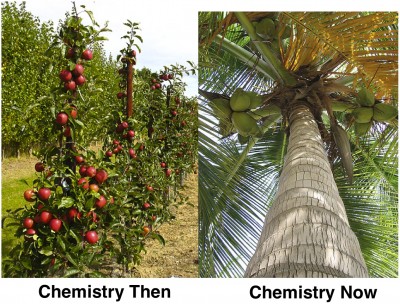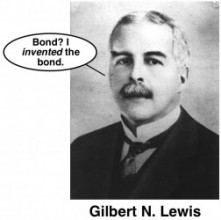This past week, I met with a visiting professor who commented that chemistry research is harder and more complex than it used to be. Most of the “low-hanging fruit” has already been picked, and the major problems facing chemistry today require relatively massive amounts of time and resources to solve.

His statement was intended to support the concept that industry today is better equipped than academia to solve chemistry’s biggest challenges, despite the independence that academic researchers have. An interesting point in itself, but the comment sent my mind down a rabbit trail* as I tried to imagine what it would be like to be a chemist living in the time of low-hanging fruit, perhaps in the early days of the Journal of the American Chemical Society (JACS).
 JACS, in case you’re unfamiliar, is one of the most highly-respected journals that a chemist can publish in. Every chemistry graduate student wants a JACS paper(s), if at all possible. However a submission entitled “Note on a Sample of Old Butter” just isn’t going to cut it in this day and age, though – yes – that is a real title from a real JACS paper from 1887. Low-hanging fruit indeed.**
JACS, in case you’re unfamiliar, is one of the most highly-respected journals that a chemist can publish in. Every chemistry graduate student wants a JACS paper(s), if at all possible. However a submission entitled “Note on a Sample of Old Butter” just isn’t going to cut it in this day and age, though – yes – that is a real title from a real JACS paper from 1887. Low-hanging fruit indeed.**
Gilbert Lewis (as in, Lewis dot structures, Lewis acids – the Gilbert Lewis) had some of the best titles. Whereas current JACS articles have long, very specialized names like Oxidation of a Cyclometalated Palladium(II) Dimer with “CF3+“: Formation and Reactivity of a Catalytically Competent Monomeric Palladium(IV) Aquo Complex (ref), Gilbert Lewis’ chemistry  back in the early 1900s was so fundamental that he was able to get away with sweepingly broad descriptors for his articles:
back in the early 1900s was so fundamental that he was able to get away with sweepingly broad descriptors for his articles:
The Atom and the Molecule (ref)
Extremely Dry Liquids (ref)
The Theory of Reaction Rate (ref)
If you go back to even before Lewis’ time, to the very earliest issues of JACS (the 1880s), the titles become more comical. Apparently, you used to be able to take any old thing and analyze its consituents, and voila!** A JACS paper!
Analysis of Soap (ref)
An Analysis of Slag from Ignited Garbage (ref)
A Method for the Analysis of Mustard (ref)
Cider and Vinegar (ref)
Note on Examination of Snow Water (ref)
On the Composition of Elephant’s Milk (ref)
Analyses of Air (ref)
Well, things certainly aren’t as straightforward as they used to be.** But I guess that’s the trade-off for making progress!
*Apparently I find it fun to think about old-time science. See my earlier posts here for an in-depth look at the old butter and the elephant milk articles, and here for a bit about female scientists in the 1880s, and here for commentary on how science used to be cooler.
**To be fair, these things weren’t at all straightforward at the time, considering the lack of equipment/technology/knowledge. The authors of these old JACS papers are definitely the giants on whose shoulders we now stand.


I had a professor in college who used to explain a concept from the 1940s and then say “X won the Nobel Prize for this — shows how easy it was to win the Nobel back then.” Bitter much?